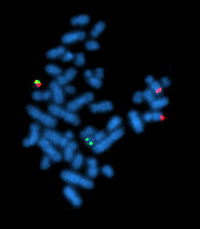
Photo from wikipedia
Background: Antrodin C, a maleimide derivative compound isolated from the ethanol extract of the mycelium of Antrodia cinnamomea, is an endemic fungus of Taiwan and a potential chemoprotective agent. However,… Click to show full abstract
Background: Antrodin C, a maleimide derivative compound isolated from the ethanol extract of the mycelium of Antrodia cinnamomea, is an endemic fungus of Taiwan and a potential chemoprotective agent. However, the molecular mechanisms underlying the mode of action of antrodin C on cancer cells, especially in human colorectal cancer (CRC), remain unclear. Methods: The cell death and ROS of the antrodin-C-treated HCT-116 cells were measured by annexin V–FITC/propidium iodide staining, DCFDA, and Fluo-3 fluorescence staining assays. Moreover, signaling molecules regulating TNFα cell death pathways and ROS/AKT/ERK/P38 pathways were also detected in cells treated with antrodin C by Western blotting and chromatin immunoprecipitation. The effects of antrodin C were determined in HCT-116 cell xenograft animal models in terms of tumor volumes and histopathological evaluation. Results: Treatment with antrodin C triggered the activation of extrinsic apoptosis pathways (TNFα, Bax, caspase-3, and -9), and also suppressed the expression of anti-apoptotic molecules Bcl-2 in HCT-116 cells in a time-dependent manner. Antrodin C also decreased cell proliferation and growth through the inactivation of cyclin D1/cyclin for the arrest of the cell cycle at the G1 phase. The activation of the ROS/AKT/ERK/P38 pathways was involved in antrodin-C-induced transcriptional activation, which implicates the role of the histone H3K9K14ac (Acetyl Lys9/Lys14) of the TNFα promoters. Immunohistochemical analyses revealed that antrodin C treatment significantly induced TNFα levels, whereas it decreased the levels of PCNA, cyclin D1, cyclin E, and MMP-9 in an in vivo xenograft mouse model. Thus, antrodin C induces cell apoptosis via the activation of the ROS/AKT/ERK/P38 signaling modules, indicating a new mechanism for antrodin C to treat CRC in vitro and in vivo.